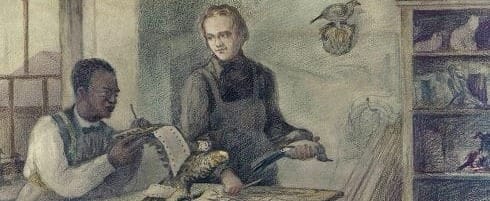✏️ Rachel Thacker
We have all been taught about Charles Darwin and his theory of evolution. However, many of us don’t know about the influence of John Edmonstone, Darwin’s black mentor and tutor.
Guyana
Born into slavery on a plantation in Demerara (present day Guyana) John Edmonstone was owned by a Scottish politician Charles Edmonstone. Charles would often invite his fellow rich white friends to the plantation, one of his guests being his future son-in-law Charles Waterton.
Wateron was a British naturalist interested in exploring the vibrant wildlife, John was assigned as his assistant for these expeditions. On these trips, John learnt valuable skills and expanded his knowledge of the nature which flourished around him.
They embarked on several trips together, which were documented in Waterton’s novel ‘Wanderings in South America’. And quickly John became a very skilled taxidermist.
Edinburgh
The Abolition of the Slave Trade Act passed in 1807, however it wasn’t until 1817 when John was granted his freedom. He travelled with the Edmonstones to Edinburgh before starting his new independent life.
As a way to make an income, John worked as a taxidermist for the Natural Museum and also as a tutor in the skill at the university of Edinburgh. His teaching space was a cramped small room overcrowded with equipment and animal figures.
Charles Darwin
Darwin originally attended university to study medicine, however with the live surgeries and the gruesome classes, he soon released it was not for him. Instead, he was more interested in naturalism and paid for private tutoring from John.
They had daily sessions together over a period of 40 weeks. During these classes, not only did John educate Darwin on the most inritque details of taximdering. But after Darwin shared his interest in the Waterton novel ‘Wanderings in South America’, the two spoke about John’s experience of the expeditions and the incredible wonders that his homeland held.
Obviously the accuracy of their conversations can’t be super specific, but we can infer from the references which are made in Darwin’s autobiography. He describes how he viewed John as a man with a high intellect and enjoyed their inspiring conversations together.
Other than this, John’s life is virtually undocumented, we don’t know much about any future work he carried out or even his death. Yet I don’t feel it is anyway a coincidence that soon after Darwin graduated he set off his voyages to see the creatures and sites which John had spoken about.
Science and politics
Throughout school we are taught that science is objective and based on conclusive facts and figures. Still, I think that the teaching of evolution has overlooked the racial backlash it faced.
We know the criticisms that Darwin faced and I even had to try explain this image in a GCSE exam;
The criticisms we always learn about are based on religion and providing an alternative to the belief of God’s creation. We never learn about how race influenced his ideas.
Darwin was anti-slavery, which I feel was certainly influenced by his admiration and respect for John. From having this attitude it allowed him to challenge the standing belief that whites were a superior being than black people.
Darwin’s suggestion that we all came from the same ancestor was targeted as a sort of anti-slavery propoganda. With white people not wanting to let go of the idea of their superiority, which they had used to legitimise their cruel treatment of others.
Why we should learn about John Edmonstone
John is a key example of black people who have influenced famous ideas and yet we never know about them. I feel that John’s background and race was significant in the nurturing of Darwin’s desires to explore.
Yet we should also still credit John’s own natural curiosity about the natural world that encompassed his life. I hope that in the future when kids are learning about evolution, that John Edmonstone and his influence on Darwin is in the textbooks.
Thanks for reading our article! We know young people’s opinions matter and really appreciate everyone who reads us.
Give us a follow on Instagram, Twitter and Facebook to stay up to date with what young people think.

